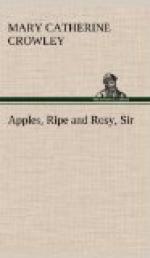“I don’t know how to thank you, sir!” stammered Bernard, gratefully. Then he hurried home to tell his mother all that had happened, and to put into her hands the bank-notes, for which she could find such ready use.
Doctor Sullivan called to see Mrs. Farrell the following day,
“Why,” said he, “this is a very simple case! You would not have been troubled so long but for want of the proper remedies.”
He left her a prescription, which wrought such wonders that in a fortnight she was able to resume her occupation.
From this time also Mr. Crosswell gave Bernard many opportunities by which he earned a small sum in addition to his weekly salary, and soon the Farrells were in comfortable circumstances again.
By degrees they became better acquainted with old Willis; but it was not till he began to be regarded, and to consider himself, as an intimate friend of the family that Bernard’s mother ventured to tell him they knew of his kind deed done in secret,—a revelation which caused him much confusion. Bernard had discovered long before that their eccentric neighbor, far from being a parsimonious hoarder of untold wealth, was, in fact, almost a poor man. He possessed a life-interest in the house in which he dwelt, and the income of a certain investment left to him by the will of a former employer in acknowledgment of faithful service. It was a small amount, intended merely to insure his support; but, in spite of his age, he still worked for a livelihood, distributing the annuity in charity. The noble-hearted old man stinted himself that he might be generous to the sick, the suffering, the needy; for the “miser’s gold” was only a treasure of golden deeds.
THAT RED SILK FROCK.
I.
You could not help liking little Annie Conwell; she was so gentle, and had a half shy, half roguish manner, which was very winning. And, then, she was so pretty to look at, with her pink cheeks, soft blue eyes, and light, wavy hair. Though held up as a model child, like most people, including even good little girls, she was fond of her own way; and if she set her heart upon having anything, she wanted it without delay—right then and there. And she usually got it as soon as possible; for Mr. Conwell was one of the kindest of fathers, and if Annie had cried for the moon he would have been distressed because he could not obtain it for her; while, as the two older children, Walter and Josephine, were away at boarding-school, Mrs. Conwell, in her loneliness at their absence, was perhaps more indulgent toward her little daughter than she would otherwise have been.
Annie’s great friend was Lucy Caryl. Lucy lived upon the next block; and every day when going to school Annie called for her, or Lucy ran down to see if Annie was ready. Regularly Mrs. Conwell said: “Remember, Annie, I want you to come straight from school, and not stop at the Caryls’. If you want to go and play with Lucy afterward, I have no objection, but you must come home first.”




